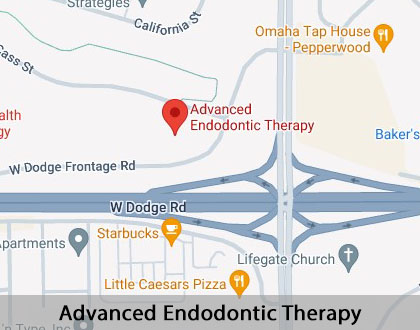Root Canal Retreatment Omaha, NE
Though rare, sometimes an endodontist must perform a root canal retreatment when a root canal fails. Endodontists perform root canals on teeth intending to have the treatment last a lifetime, but sometimes they must be redone. Some root canal retreatments are performed relatively soon after the initial procedure and some months or years later.
If you have had a root canal performed on a tooth in the past and think you may require retreatment, our team at Advanced Endodontic Therapy in Omaha is here to help. Call us at (402) 506-7111 to learn more.
When is a Root Canal Retreatment Needed?
A root canal is performed to save a natural tooth that is damaged by decay or trauma. Many root canals will last a lifetime. However, sometimes a root canal retreatment is needed to protect the tooth fully. This may be the case in the following situation:
- A delay in placing a crown after the original root canal
- A restoration failed to keep saliva from contaminating the root canal
- A trauma compromised the tooth
- Abnormally-shaped canals were not addressed during the original root canal
- Complicated anatomy of the tooth that caused the root canal to fail
- New decay or infection in a tooth
Sometimes, a root canal may need retreatment because the crown that is protecting the root canal breaks.
“However, sometimes a root canal retreatment is needed to protect the tooth fully.”
How to Know If You Need a Root Canal Retreatment
It helps to know what symptoms indicate a problem with a root canal. These symptoms include:
- A loose or cracked tooth in the area of the original root canal
- Abscess material, swelling, or pimple formation on the gumline
- Lingering pain or new pain that occurs a short time after a root canal
- Painful chewing in the area of the original root canal
- Sensitivity in the area of the original root canal
These signs may be similar to those that occurred before the original root canal. However, if there is a new problem, such as a fractured tooth, they may be different.
“These signs may be similar to those that occurred before the original root canal.”
What Happens During a Retreatment Appointment?
If a person believes they may require a root canal retreatment, the first step is scheduling a visit to the endodontist as soon as possible. During this visit, the endodontist can examine the problematic area and decide whether or not it is necessary to do a root canal retreatment.
An endodontist may use tools to determine if retreatment is necessary during this initial appointment, such as an X-ray. An endodontist may be able to perform the retreatment procedure at that time. However, they may perform the retreatment at a separate appointment.
“During this initial appointment, an endodontist may use tools to determine if a retreatment is necessary, such as an X-ray.”
Check out what others are saying about our dental services on Yelp: Root Canal Retreatment in Omaha, NE
How is a Root Canal Retreatment Performed?
An endodontist must access the root canals during retreatment to clean and disinfect them again. If a crown has been placed over the original root canal, the endodontist will first remove this crown. Then, an endodontist will use special tools to remove the original filling material.
Once the filling material is removed, an endodontist will thoroughly clean the tooth's canals, making sure to address any problematic anatomy that may have caused the first root canal to fail. Finally, an endodontist will replace the filling material and cover the root canal retreatment with a restoration. This process may take more than one visit; however, it may be possible to complete the whole procedure in a single visit.
“Once the filling material is removed, an endodontist will thoroughly clean the tooth’s canals, making sure to address any problematic anatomy that may have caused the first root canal to fail.”
Questions Answered on This Page
Q. What circumstances require a root canal retreatment?
Q. How do I know if I need a root canal retreatment?
Q. What happens at the first appointment?
Q. What happens during a root canal retreatment?
Q. How do I care for my root canal retreatment?
People Also Ask
Q. What should patients do after a root canal?
Q. How can I tell if I have a cracked or broken tooth?
Q. What are the different types of tooth root fractures?
Q. What can cause a tooth infection? What are the symptoms of a tooth infection?
Aftercare
After a root canal retreatment, an endodontist will provide instructions that are tailored to each patient's procedure. It is crucial that the patient follow these instructions and ask questions to ensure that the aftercare plan is clear. In general, aftercare for root canal retreatment involves avoiding chewing hard foods with the affected tooth and gently keeping the area clean. Over-the-counter medications can help with any discomfort. It is important to watch for signs of infection, such as pus drainage or an increase in pain.
“Over-the-counter medications can help with any discomfort.”
Frequently Asked Questions
Q. What are the treatment options for a failed root canal?
A. According to the American Association of Endodontists (AAE), if a root canal retreatment is not desired or feasible, an endodontic surgery such as an apicoectomy (+root end resection) is an alternative. Extraction of the tooth is another way to treat a diseased tooth. However, saving the natural tooth is always best.
Q. Why should I see an endodontist for root canal retreatment?
A. Dentists who perform root canals may also perform root canal retreatments. However, an endodontist is highly trained in complex root canal procedures, especially those that have failed initially. In addition, endodontists perform many more procedures dealing with the insides of teeth on a weekly basis than the average dentist.
Q. How long will a root canal retreatment last?
A. A root canal retreatment is generally initiated with the same intention as an initial root canal. The goal of both procedures is to repair a tooth so that it lasts for a lifetime. However, it is not possible to guarantee that a root canal retreatment will last forever.
Q. What might cause a tooth not to heal fully after an initial root canal?
A. A variety of factors can cause a root canal to fail. Complex anatomy, such as narrow or curved canals, may play a role in root canal failure. It may also happen because of a delayed restoration after the first treatment or contamination inside the tooth.
Q. What might cause a root canal to fail years after the initial root canal?
A. Typically, root canals that fail after years of success do so because of a new problem with the tooth. New decay, a cracked filling, or a fracture could be behind the failure. It also may be because of a problem with the restoration.
Start Feeling Better – Visit Us Today
By visiting us as soon as possible, our team can help get you the professional treatment you need. Instead of waiting around and allowing the symptoms to get worse, we can provide you with treatment options.
Definitions
Call Us Today
Though it is rare, root canals fail even under the best of circumstances. However, an endodontist can still save your tooth. If you are interested in having a root canal reevaluated, call us today at (402) 506-7111 .
Helpful Related Links
- American Association of Endodontists. Endodontic Retreatment Explained. 2024
- Cleveland Clinic. Root Canal. 2024
- Dear Doctor Dentistry & Oral Health. Root Canal Retreatment. 2024
- Decisions in Dentistry. Endodontics Approaches to Nonsurgical Root Canal Retreatment. 2024
- Inside Dentistry. Endodontic Retreatment Techniques. 2024
- MDPI. Removal of the Previous Root Canal Filling Material for Retreatment:. 2024
- NIH: National Library of Medicine. Endodontic procedures for retreatment of periapical lesions. 2024
- ScienceDirect. Endodontic Retreatment. 2024
About our business and website security
- Advanced Endodontic Therapy was established in 2008.
- We accept the following payment methods: Cash, Discover, MasterCard, and Visa
- We serve patients from the following counties: Douglas County, Dodge County, Lancaster County, and Sarpy County
- We serve patients from the following cities: Omaha, Benson, Florence, Bellevue, Fort Calhoun, Papillion, Lincoln, Bennington, Plattsmouth, Fremont and Elkhorn, Missouri Valley, and Council Bluffs
- Norton Safe Web. View Details
- Trend Micro Site Safety Center. View Details
Back to top of Root Canal Retreatment










